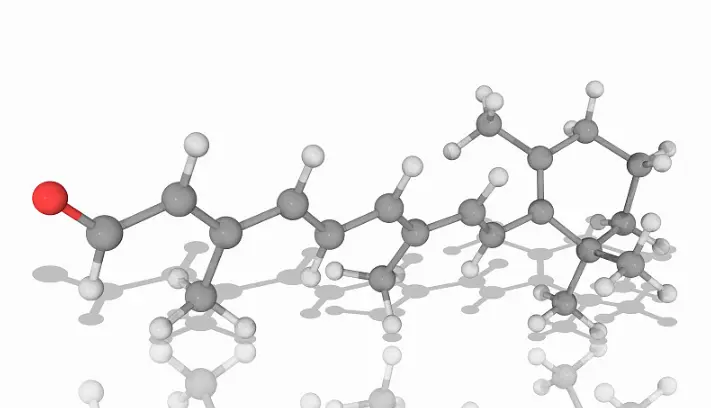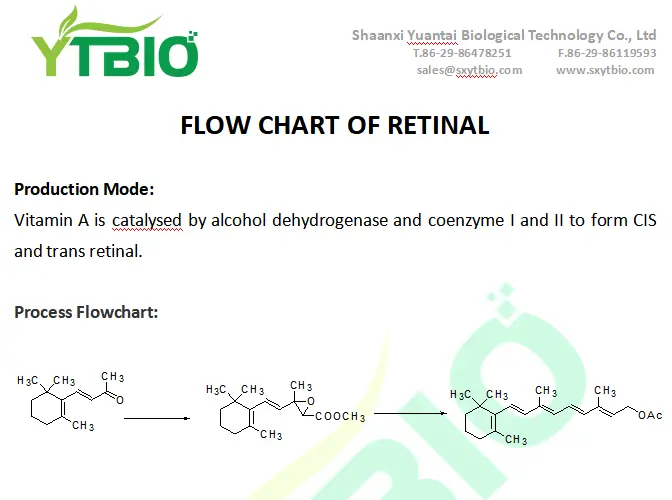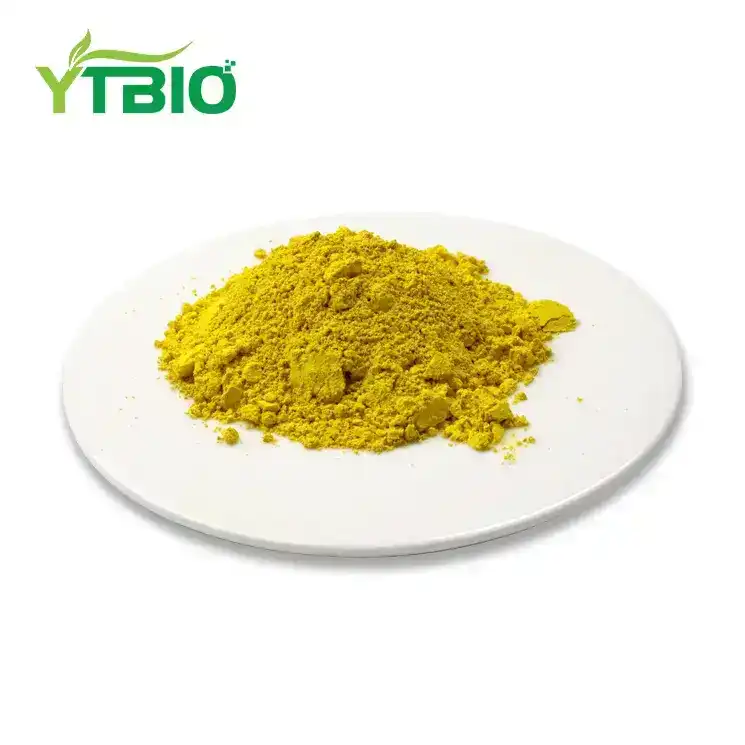Retinal Powder
CAS: 116-31-4
Specifications: 99%
Packaging: 25kg/drum
Storage: Long-term storage at -20℃
Payment: T/T,VISA,XTransfer,Alipay......
Shipping Speed: 3-5 days
Certification:cGMP,ISO22000,ISO9001,EU&NOP Organic Certificate,Kosher,BRC,Halal,HACCP
- Fast Delievery
- Quality Assurance
- 24/7 Customer Service
Product Introduction
How Much Do You Know About Retinal Powder?
Retinal powder, also known as vitamin A aldehyde, is a key derivative in the vitamin A metabolic pathway, with the molecular formula C₂₀H₂₈O. It can be generated from β-carotene through an oxidative cleavage reaction, and can be further reduced to retinol (vitamin A) or oxidized to retinoic acid (retinoic acid) in the body. Due to its structural and functional similarity to retinoic acid, retinal is considered the vitamin A derivative closest to retinoic acid, but it is less irritating and more suitable for sensitive skin care. Retinal is widely used as an active ingredient for anti-wrinkle, anti-aging, and anti-acne purposes. Retinal powder is gentler on the skin and can be converted into retinoic acid in the body, exerting multiple effects such as regulating keratinization, improving photoaging, and reducing acne. It is a skin care ingredient that combines efficacy and tolerability.

Product Features:
Highly Efficient Conversion
As an oxidized derivative of retinol, retinal has a more direct metabolic pathway in the body, requiring only one enzymatic reaction to be converted into highly bioactive retinoic acid (retinoic acid). Studies have shown that its conversion efficiency is approximately 11 times that of retinol, enabling it to initiate anti-aging and other related physiological functions more rapidly. Furthermore, excess retinaldehyde in the body can be reduced to retinol for storage, helping to prevent excessive accumulation of active ingredients and maintain the metabolic balance of skin tissue.
Stability
Retinal contains multiple unsaturated double bonds in its chemical structure, making it prone to cis-trans isomerism and sensitive to environmental factors such as light and heat, resulting in poor stability. To improve its activity and durability in skincare products, it is often protected using formulation technologies such as liposome encapsulation.
Basic Properties
Retinal powder has the molecular formula C₂₀H₂₈O and appears as orange crystals or a liquid. Its structural characteristics result in it being almost insoluble in water, but readily soluble in oils and common organic solvents (such as ethanol and chloroform). This property also affects its distribution in vivo and its formulation in cosmetics.
YTBIO: Providing High-Quality Retinal powder and Services


Retinal Powder: Multiple Physiological Functions
Visual Health
Retinal is an important component of rhodopsin in retinal photoreceptor cells, combining with opsin to form visual pigments. Under light conditions, retinal undergoes an isomerization reaction, converting light signals into neural electrical signals, which are then transmitted to the brain to form visual images. This mechanism is crucial for dark adaptation and night vision; retinal deficiency may lead to night blindness or decreased dark adaptation.
Skin Health
Anti-aging and Skin Texture Improvement
Retinal effectively promotes collagen synthesis, enhances skin elasticity, and accelerates epidermal cell renewal, thereby reducing fine lines and wrinkles, improving rough and dull skin, and making skin firmer and smoother.

Oil Control and Anti-acne Effects
This ingredient has the ability to regulate sebum secretion and inhibit the activity of Propionibacterium acnes, helping to reduce clogged pores and inflammation, providing comprehensive improvement for oily skin and acne problems.
Antioxidant and Photoprotection
Retinal also enhances the skin's self-repair ability against UV damage, reducing problems such as age spots and abnormal texture caused by photoaging.
Mildness and Suitability
Compared to traditional retinoids like retinoic acid, retinal powder exhibits superior skin tolerance with significantly reduced irritation, making it more suitable for long-term use on various skin types, including sensitive skin. It undergoes a single conversion in the body to produce retinoic acid, combining high efficacy with gentleness. Therefore, it is frequently recommended for use in anti-wrinkle and anti-acne skincare products, with common concentrations ranging from 0.05% to 0.15%.
Retinal Powder: Application Areas
Dermatology and Skincare
Retinal powder plays a central role in skin health management, with a well-defined mechanism of action and significant effects. In skincare applications, it effectively promotes collagen synthesis and epidermal cell renewal, thereby improving skin elasticity, reducing wrinkles and fine lines, and helping to even out skin tone. Simultaneously, this ingredient plays a preventative and therapeutic role against common skin problems such as acne by regulating sebum secretion, inhibiting Propionibacterium acnes activity, and reducing inflammation. Clinical studies show that appropriate concentrations of retinaldehyde preparations perform excellently in improving photoaging and acne, and have better skin tolerance compared to retinoic acid.

Visual Health
In the visual system, retinal is a key structural component of rhodopsin, directly involved in the light signal transduction process. This function makes it indispensable in maintaining normal dark adaptation and retinal health. Clinically, it is also used to prevent and treat vitamin A deficiency-related night blindness and dry eye syndrome, among other eye diseases.
Nutritional Science and Other Applications
As the active form of vitamin A, retinaldehyde is used in human nutritional supplements and animal feed, helping to support immune function, promote growth and development, and maintain normal visual function. Furthermore, in the scientific research field, retinaldehyde is an important tool molecule for studying visual physiology and photochemical mechanisms, and its photosensitizing properties also offer possibilities for the development of novel photofunctional materials.

Retinal Powder: A Highly Effective Yet Gentle Anti-Aging Ingredient
Retinal, a key derivative of Vitamin A, plays a vital role in skin anti-aging. Its value stems from its unique position in the retinoic acid metabolic pathway: possessing biological efficacy close to that of retinoic acid while exhibiting superior skin tolerance.
Advantages and Mechanism of Action
In the metabolic pathway of Vitamin A derivatives, retinal occupies a crucial node between retinol and retinoic acid. Compared to retinol, which requires two oxidation steps to convert to retinoic acid, retinal only requires a single enzymatic reaction. This characteristic makes its conversion efficiency significantly higher than retinol, allowing it to exert its biological effects more directly in skin tissue.
Studies have shown that retinal can not only be rapidly oxidized to retinoic acid but can also be reduced to retinol for storage when not needed by the skin, forming a reversible metabolic regulation mechanism. This dual-transformation capability allows for precise release of active ingredients according to skin needs, avoiding irritation caused by excessive retinoic acid accumulation.
Clinical Validation
Multiple clinical trials have confirmed the gentle properties of retinal. Studies show that even at higher concentrations (e.g., 1%), most subjects exhibited good skin tolerance. Compared to retinoic acid, its irritation is significantly reduced, providing important evidence for its application in daily skincare products.
Multiple Improvement Effects
Retinal, through its conversion to retinoic acid, activates cell-related signaling pathways, thereby exerting multiple skin repair functions:
Promoting collagen synthesis and repairing photoaging-induced damage to elastic fibers and collagen
Regulating keratinocyte differentiation, increasing epidermal thickness, and improving skin texture
Inhibiting excessive sebum secretion, possessing both comedone-dissolving and antibacterial effects, and improving acne
Regulating skin angiogenesis and reducing inflammatory responses
Therefore, Retinal Powder, with its highly efficient metabolic properties, proven clinical efficacy, and good tolerability, demonstrates unique advantages in anti-aging and skin problem improvement. As a precursor to retinoic acid, it achieves a good balance between efficacy and safety, becoming an active ingredient with important application value in cosmetic formulations.

References:
Stefanaki, C., Stratigos, A., & Katsambas, A. (2005). Topical retinoids in the treatment of photoaging. Journal of cosmetic dermatology, 4(2), 130-134.
Kedishvili N. Y. (2016). Retinoic Acid Synthesis and Degradation. Sub-cellular biochemistry, 81, 127–161.
Saurat, J. H., Didierjean, L., Masgrau, E., Piletta, P. A., Jaconi, S., Chatellard-Gruaz, D., ... & Siegenthaler, G. (1994). Topical retinaldehyde on human skin: biologic effects and tolerance. Journal of investigative dermatology, 103(6), 770-774.
Didierjean, L., Carraux, P., Grand, D., Sass, J. O., Nau, H., & Saurat, J. H. (1996). Topical retinaldehyde increases skin content of retinoic acid and exerts biologic activity in mouse skin. Journal of investigative dermatology, 107(5), 714-719.
FAQ
Q1: What are the specific details of YTBIO's retinaldehyde raw material?
A1: This product is high-purity 99% retinaldehyde powder, also known as vitamin A aldehyde, CAS number 116-31-4. It is a key active ingredient in the vitamin A metabolic pathway, renowned for its highly effective anti-aging and skin repair capabilities, while being gentler than retinoic acid.
Q2: Are there any special requirements for storage and transportation?
A2: To ensure the long-term stability and activity of the product, we strongly recommend long-term storage at -20℃. Refrigeration will be used during transportation to ensure the quality of the raw material from the factory to your hands.
Q3: How does YTBIO guarantee the quality and safety of this raw material?
A3: YTBIO's retinaldehyde raw material production strictly adheres to international standards. We hold a series of authoritative certifications including cGMP, ISO22000, ISO9001, BRC, and HACCP. In addition, we have obtained Kosher and Halal certifications to meet the diverse needs of different markets and customer groups around the world.
_1737093401309.png)

